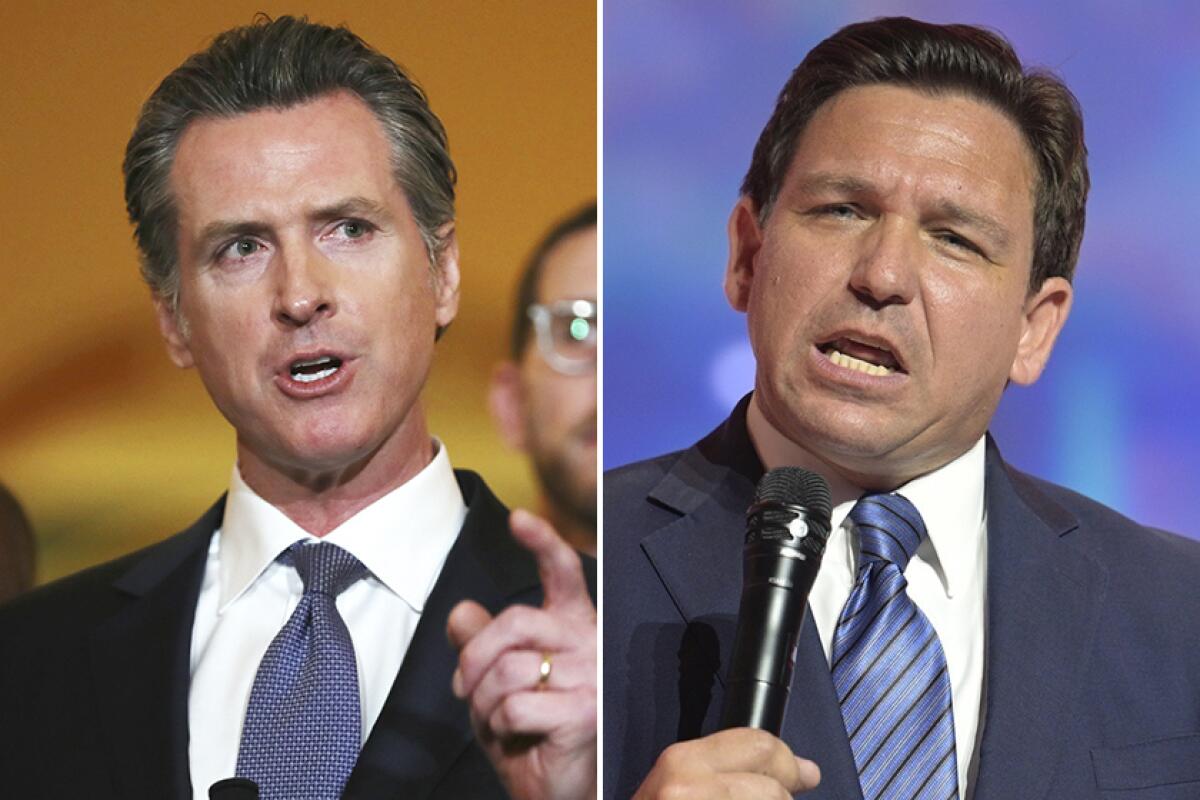California Politics: What to make of state GOP giving Trump a boost

SACRAMENTO — Three days before former President Trump was indicted on criminal charges over his attempts to maintain power after losing reelection in 2020, leaders of the California Republican Party gathered in Irvine and made a critical decision that could shape next year’s presidential race:
State GOP leaders changed the rules for allocating delegates in California’s presidential primary in a way that is likely to help Trump in the 2024 presidential election — a move that reflects a concerted effort by the Trump campaign to shape state party rules across the country to benefit his candidacy.
Yes, Trump is miles ahead of his primary opponents in the polls and a state party rule change may sound, at first blush, like nothing more than a technical detail. But presidential nominations are won by racking up delegates, and California has more of them than any state in the nation.
That makes the state GOP’s decision to award all 169 delegates to the candidate who receives more than 50% of the vote in the March 5 primary a big deal. Especially since the candidate most likely to benefit from the new rule is now under criminal indictment in three separate legal cases, an unprecedented circumstance in American history.
“The party is now about loyalty and fealty,” said Mike Madrid, a former political director for the California GOP who has become one of the party’s most vocal critics of Trump.
“The Republican Party has completely removed itself from any sort of ideological or policy discussion. It has taken on the characteristics of an authoritarian movement.”
Trump’s campaign supported the new plan for awarding delegates in California because polling shows he can win more than half the votes in the state’s primary, allowing him to sweep up the state’s huge haul of delegates, a member of the California GOP’s executive committee told my colleague Seema Mehta. If no candidate gets a majority of the votes, delegates will be awarded proportionally based on the statewide vote. Trump strategists also thought a previous proposal — that the California GOP scrapped — could have helped Florida Gov. Ron DeSantis because it would have awarded a large batch of delegates to the second-place finisher.
State party Chair Jessica Millan Patterson called the new plan “a massive victory for California Republicans who are eager to have a say in deciding who our Party’s 2024 presidential nominee will be.” She said it will encourage Republican voters to turn out at the polls.
But the upshot of the rule change is a system for California’s Republican primary that will favor Trump, discourage other GOP candidates from campaigning here and make the state less competitive in the nominating contest.
“This is about not even giving conservative activists in the Republican Party a voice,” Madrid told me. “It’s about saying that the number one characteristic required for party involvement is fealty to the leader. Those are horrific words that should echo throughout history.”
Days after changing the rules for the primary, the California GOP announced that Trump will be the keynote speaker at the party’s convention next month in Anaheim. DeSantis will also address the convention, and other GOP presidential candidates are expected to attend as well.
I’m Laurel Rosenhall, the Times’ Sacramento bureau chief, here with the week’s biggest news in California politics.
Hair gel vs. Hairspray

Almost a year after California’s Democratic Gov. Gavin Newsom first challenged Florida’s Republican Gov. Ron DeSantis to debate — with a tweet saying, “I’ll bring my hair gel. You bring your hairspray.” — the two governors are one step to closer to facing off on stage.
DeSantis agreed to debate Newsom on Wednesday during an interview with Sean Hannity on Fox News: “Let’s get it done,” DeSantis said. “Just tell me when and where. We’ll do it.”
Newsom sent Hannity a proposal last week detailing his terms for a debate: 90 minutes, aired live on Fox News, no live audience, no notes or prepared documents on stage. Newsom said he would do the debate on Nov. 8 or Nov. 10 in Nevada, Georgia or North Carolina.
“This event will be marketed as a Red v. Blue debate that is focused on the impact of representation at the state level,” says Newsom’s pitch letter to Hannity.
Newsom’s thirst to debate DeSantis is unsurprising. The California governor has made a habit of baiting the Florida governor, trolling him in TV ads aired in Florida, visiting with students and faculty from a Florida college where DeSantis has installed conservative trustees, and most recently threatening kidnapping charges after DeSantis sent a plane carrying South American migrants to Sacramento. Newsom’s debate plea is consistent with his efforts to elevate himself onto the national stage as a crusader for liberal America.
DeSantis’ agreement to debate Newsom is harder to understand. He’s running for president, so debating Newsom is an obvious step down for a candidate who should be sparring with Trump or President Biden. Newsom is “like a gnat or mosquito in your face just trying to annoy you and get attention to distract from what’s really going on in his own state,” Nick Iarossi, a Tallahassee lobbyist and informal advisor to DeSantis, told my colleague Taryn Luna earlier this summer.
With DeSantis’ presidential campaign floundering, however, he appears to have lost his mosquito repellent.
What else could be on the 2024 ballot?
After trying and failing twice before, a coalition of housing advocates led by the AIDS Healthcare Foundation have collected enough signatures to place a measure on the 2024 ballot asking voters to repeal a major restriction on rent control, Times writer Ben Oreskes reports.
If passed by voters, the measure would allow more cities and counties across the state to cap rents on more types of homes. Backers of the initiative said the changes would give Californians living on the edge an ability to hold on to their housing as wages lag behind increases in rent across the state. Opponents said the measure would discourage landlords from making their properties available to rent because they would be prevented from charging fair market value.
Two other campaigns announced plans this week to begin collecting signatures to try to land initiatives on next year’s ballot:
- One would reform California’s public records laws and force politicians to disclose more information — a move supporters say will curb government corruption and keep voters in the know. It would require lawmakers to provide details about their meetings with lobbyists, political fundraising events and investigations of misconduct. The measure would also set stricter standards for government agencies, mandating they more quickly and comprehensively provide documents to the public.
- Another would require health and safety buffer zones around new oil and gas wells, raising the possibility that California voters could see two similar measures on the November 2024 ballot. If passed, the measure would override the outcome of a referendum oil interests already qualified for the same ballot. The referendum seeks to overturn SB 1137, a law Newsom signed in September banning new wells within 3,200 feet of schools, homes and buildings open to the public.
Enjoying this newsletter? Consider subscribing to the Los Angeles Times
Your support helps us deliver the news that matters most. Become a subscriber.
Keeping up with California politics
Why child marriage is legal in California — and the unexpected groups fighting to keep it that way
While child marriage is recognized as a human rights violation by the United Nations, there is no minimum age requirement to become married in California. It may come as a surprise in this progressive state, but liberal groups argue that banning minors from marriage could be a slippery slope that impedes reproductive choices, including access to abortion.
Expanding the Supreme Court is a longshot. Why California’s Senate candidates support it
While the political harmony among Democratic Reps. Barbara Lee, Katie Porter and Adam Schiff may not be surprising in a state as left-leaning as California, it does provide a preview of what’s to come in the presidential race and congressional elections, where Supreme Court expansion, and other efforts to rein in its power, will be top priorities for liberal activist groups and Democratic voters.
A California housing law led to thousands of new homes, report says. Why that’s not enough
One of California’s most powerful housing laws helped lead to the construction of thousands of new homes, according to a new report, providing an early indicator of success while also highlighting the difficulty the state faces in solving its multimillion-unit shortage.
Barabak: A Democrat and Republican battled for Congress. They became unlikely friends
Times columnist Mark Barabak broke bread recently with Democratic Rep. Ami Bera and GOP political strategist Rob Stutzman. “Their improbably companionable relationship comes at a time when partisan differences run marrow-deep and many Democrats and Republicans view their parties not as vessels of collected interests but warring tribes locked in mortal conflict,” he writes.
California politicians ask Taylor Swift to cancel concerts. She won’t shake it off
More than four dozen state and local politicians, including Lt. Gov. Eleni Kounalakis, who is running to be California’s next governor, sent an open letter to Taylor Swift asking her to “stand with hotel workers” and postpone her L.A. tour dates. It’s an impossible ask, but one the singer can’t ignore, writes Times columnist Anita Chabria.
The ‘Johnny Appleseed of election fraud’ wants to upend voting in America. Why he’s focused on California
Douglas Frank’s more than 50 speeches in California and hundreds more across the country are part of a multi-pronged effort by the election denial movement to make a significant impact on future elections by changing state laws, training candidates and organizing volunteers to challenge local results and voter rolls.
Battle over legacy and donor admissions preferences to heat up. USC, Stanford could take hit
Assemblyman Phil Ting (D-San Francisco) plans to renew efforts to deny state financial aid to any college or university that gives an admissions advantage to applicants who are family of alumni and donors, a group that is overwhelmingly white and affluent. Ting’s plan comes as the recent U.S. Supreme Court ruling striking down race-based affirmative action in college admissions reignited a national outcry over the use of preferential treatment for legacy applicants.
‘No one is coming to our rescue’: Inside rural California’s alarming teacher shortage
The teacher shortage is so dire in remote Modoc County that administrators say they have no choice but to violate a new state law that will require public school districts to soon offer free preschool to all 4-year-olds. People in California’s rural north feel as if this famously liberal state is leaving them behind — a feeling of alienation that has long fueled the region’s conservative politics.
Stay in touch
Did someone forward you this? Sign up here to get California Politics in your inbox.
Until next time, send your comments, suggestions and news tips to [email protected].
Sign up for Essential California
The most important California stories and recommendations in your inbox every morning.
You may occasionally receive promotional content from the Los Angeles Times.




